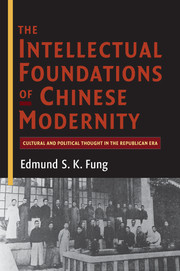 The Intellectual Foundations of Chinese Modernity
The Intellectual Foundations of Chinese Modernity Published online by Cambridge University Press: 03 May 2010
This chapter continues our exploration of Chinese liberal thought by probing the underlying issues of political modernity in terms of state power, good government, political elitism and institutional development. From the beginning of the Republican era, the quest for modernity was a state-building project. The modern state is a complex organization with the following characteristics: a defined territory, popular sovereignty, a rational bureaucracy, rule of law, industrialism, the use of rational technologies, a national economy, a sizable bourgeoisie, democratic institutions, a national taxation system and universal education. Externally, the modern state obeys international law, has a national armed force and is prepared to go to war to defend its sovereignty, territorial integrity and national interests. As such, the modern state was a tall order for Republican China's state builders. The early Republic was at best a political experiment and at worst a shoddy political structure ruled by a succession of militarists after the death of President Yuan Shikai until 1928. Even after 1928, the military was in the ascendant. Industrialization was only just beginning, civil society was weak, law and order were poorly maintained, a rational administration was nonexistent and the foreign threat was ever increasing. The challenges for the state builders were enormous. A key question for them was: What sort of government was best suited to China's conditions, and what was the role of the state?
From the classical liberal point of view, the best state is the minimal state, and the best government governs least.
To save this book to your Kindle, first ensure no-reply@cambridge.org is added to your Approved Personal Document E-mail List under your Personal Document Settings on the Manage Your Content and Devices page of your Amazon account. Then enter the ‘name’ part of your Kindle email address below. Find out more about saving to your Kindle.
Note you can select to save to either the @free.kindle.com or @kindle.com variations. ‘@free.kindle.com’ emails are free but can only be saved to your device when it is connected to wi-fi. ‘@kindle.com’ emails can be delivered even when you are not connected to wi-fi, but note that service fees apply.
Find out more about the Kindle Personal Document Service.
To save content items to your account, please confirm that you agree to abide by our usage policies. If this is the first time you use this feature, you will be asked to authorise Cambridge Core to connect with your account. Find out more about saving content to Dropbox.
To save content items to your account, please confirm that you agree to abide by our usage policies. If this is the first time you use this feature, you will be asked to authorise Cambridge Core to connect with your account. Find out more about saving content to Google Drive.